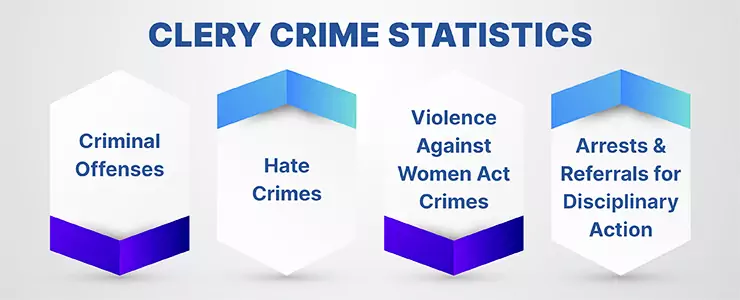Are you a campus security authority? Have you just received a letter from your institution identifying you as a campus security authority? Campus security authorities have a duty under the Clery Act to notify their institution of crimes that are reported to them. Are you aware of the crimes that you need to report as a CSA?
What is the Clery Act?
The Clery Act is a federal law which requires your institution to disclose crimes that have occurred on your campus. Your institution compiles this report by collecting crime statistics from various sources. This includes people whom the Clery Act identifies as the campus security authorities of the campus.
Your job as a campus security authority is to share crime information with your institution, whenever someone reports a crime to you. But, you don’t need to report all crimes to your institution. You only need to report Clery Act crimes that happen over the Clery Act geography of your institution.
What crimes do you need to report under the Clery Act?
As a campus security authority, you need to report crimes that fall under the preview of the Clery Act. Clery crimes are classified into four major categories –
- Criminal offenses such as burglary, vehicle theft, and homicide. Sex offenses are also counted as criminal offenses.
- Hate crimes such as destruction of property, intimidation and physical assaults. The crimes have to be motivated by the offender’s bias against the victim.
- Violence against Women Act crimes. VAWA crimes includes criminal acts such as dating violence, stalking, sexual assault and domestic violence against women.
- Arrest and Disciplinary referrals for liquor, drug and weapon law violations.
Read on to learn about the crimes included under these four categories.
-
Criminal offenses
Here’s the list of criminal offenses that are considered as criminal offenses under the Clery Act.
-
- Criminal Homicide – Crimes that involve killing of a person. Such offenses are separated into murder and non-negligent manslaughter, and manslaughter by negligence.
Any incident of killing of a person that’s done willfully should be reported under the first category. This includes any death caused by injuries received in a fight, argument, quarrel, assault, or while carrying out another crime.
While a homicide committed through gross negligence of a person should be counted as manslaughter by negligence.
-
- Sex Offenses – The Clery Act requires you to report the following four types of sexual offenses.
- Rape
- Fondling
- Incest
- Statutory Rape
- Sex Offenses – The Clery Act requires you to report the following four types of sexual offenses.
The statutory age of consent differs by state. You’ll need to consult your state’s statutes for the information.
-
- Robbery – Robbery is taking (or an attempt to take) anything of value from the care, custody or control of another person by force or threat of force. Report the incident as robbery if –
- It was committed in presence of the victim
- Victim was directly confronted by the perpetrator
- Victim was threatened by force or threat of force
- Involves a theft (larceny)
- Robbery – Robbery is taking (or an attempt to take) anything of value from the care, custody or control of another person by force or threat of force. Report the incident as robbery if –
-
- Aggravated assault – Aggravated assault is an attempt to cause serious bodily harm to an individual with disregard to his or her life. Such assault involves the use of a weapon or means likely to cause severe harm. Consider the following factors when classifying an assault as aggravated assault –
- Use of a weapon
- The seriousness of the injury
- The intent of the assailant to cause serious injury
- Aggravated assault – Aggravated assault is an attempt to cause serious bodily harm to an individual with disregard to his or her life. Such assault involves the use of a weapon or means likely to cause severe harm. Consider the following factors when classifying an assault as aggravated assault –
-
- Burglary – Burglary is an unlawful entry into a building or structure to commit a felony or crime.
-
- Motor vehicle theft – Theft or an attempted theft of a motor vehicle. Cases in which the vehicle was later abandoned by the perpetrators should also be reported as motor vehicle theft.
- Arson – Arson is willful and malicious burning or an attempt to burn a property. This includes fires set to public buildings, motor vehicles, or personal property. You should report all arsons, including burning waste baskets and bulletin boards in an on-campus dormitory.
[Also Read: Why is Campus Safety so Important in Educational Institutions]
-
Hate crimes
The second category of Clery crimes is hate crime. It’s a criminal offense that carries the evidence that the victim was selected because of the offender’s bias against the victim. You must report crimes committed because of the following eight categories of bias.
Eight Categories of Bias under the Clery Act –- Race
- Religion
- Sexual orientation
- Gender
- Gender identity
- Ethnicity
- National origin
- Disability
Reportable hate crimes include the following crimes motivated by bias.
- Criminal homicide
- Sexual Assault
- Robbery
- Aggravated Assault
- Burglary
- Motor vehicle theft
- Arson
- Larceny-Theft
- Simple Assault
- Intimidation
- Destruction, damage or vandalism of property
You can refer to the Criminal Offenses section for the first seven types of offenses. Read on to know about the last four types of crimes you need to report.
- Larceny-Theft – Larceny is taking away someone else’s property without using force. It includes theft from the constructive possession of another. A few examples of Larceny-Theft are-
- Theft of automobile and bicycle accessories
- Shoplifting
- Pocket-picking
- Stealing of any property/article
- Attempted larceny
- Simple Assault – It’s an unlawful physical attack by one person upon another. It doesn’t involve the offender using (or displaying) a weapon, and it doesn’t result in aggravated injury to the victim.If the incident involves a weapon or causes severe injuries to the victim, you’ll have to report it as a criminal offense.
- Intimidation – Intimidation is placing another person in reasonable fear of harm by using threatening words or conducts. If the incident involves use or display of weapons, it’s not intimidation. You should report all incidents in which the victim reports the incident to law enforcement, including incidents in which a victim reports seeing threats over walls, and receiving threats via electronic means.
- Destruction, damage or vandalism of property – Incidents in which the offender destroys, damages, defaces, or injures a person’s property should be reported in this category.
-
Violence Against Women Act crimes
Offenses reportable as VAWA offenses include dating violence, domestic violence, stalking, and sexual assault. Of the four, sexual assault is a criminal offense; the other three are considered as crimes for Clery reporting. You can read about sexual assault in the criminal offense section. Here’s an overview of the other three offenses.
-
- Dating violence – Violence committed by a person who’s in a social relationship of romantic or intimate nature with the victim. Dating violence includes sexual or physical abuse or the threat of such abuse.
- Domestic violence – Domestic violence is a felony or misdemeanor crime of violence committed by a current or former spouse or intimate partner of the victim. Crimes committed by a person against an adult or youth victim who’s protected from that person’s acts under applicable domestic or family laws should also be considered as domestic violence.
- Stalking – Stalking is defined as engaging in a course of conduct directed at a person that would cause the victim to fear for his or her safety or the safety of others, and cause substantial emotional distress to the victim. Stalking requires two or more such acts. For Clery purposes, it’s not necessary that all the activities should have taken place over Clery geography.
-
Arrest and Disciplinary referrals for liquor, drug and weapon law violations
You also need to report arrests for violations of the following three laws.
-
- Liquor laws
- Drug abuse laws
- Weapons law
Arrests for violation of laws and ordinances dealing with weapon offenses should be reported as a crime. Similarly, arrests for violation of state and local laws prohibiting the manufacture, possession or use of alcoholic beverages are reportable as crimes. This does not include arrests for drunkenness and driving under influence. Arrests for drug charges should also be reported as a Clery crime.
If your institution has identified you as a campus security authority, then you have a legal obligation to inform your institution of crimes that are reported to you in your capacity as a campus security authority. You must pass on this information even if it was shared with you in confidence. You may choose to withhold the information about the identity of the victim when reporting the incident, but you must report the incident.
To learn more about your crime reporting duties under the Clery Act, you should go through the handbook for campus safety and security reporting. Here’s the link to the latest edition.
Do remember that what you are reporting to your institution is an alleged criminal incident. Did the crime really happen? It’s not your duty to find out if the incident happened or not. It’s the job of law enforcement.
Are you a designated campus security authority of your institution? Would you like to share your experience with our readers? We’d love to know how interesting your job really is. You can share your views with us in the comment section below.







